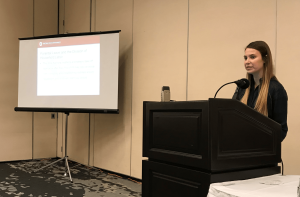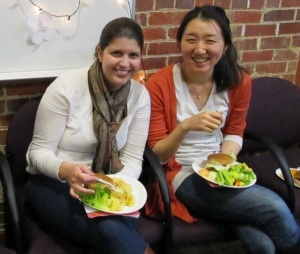
Dear prospective student,
I am excited that you are interested in applying to work with me at The University of Minnesota and are considering pursing a Ph.D. in Sociology! Learn more about Minnesota’s Sociology graduate program here.
I strongly believe in graduate training in an interdisciplinary setting that exposes students to a variety of perspectives from across disciplines. I have three degrees in Human Development and Family Studies from Minnesota’s fellow Big Ten universities, The University of Illinois and the Pennsylvania State University. Thus, I have been trained across disciplines, and I strive to give my graduate students a broad, interdisciplinary perspective on intimate relationships and family sociology and demography. My perspective draws on the psychological, sociological, and economic literatures, and uses statistical methods from sociology, demography, and econometrics. I hope you find this prospect exciting! I have found that excellent, cutting edge scholarship grows out of applying interdisciplinary perspectives to data including both secondary and primary data, as well as self-report, observational, and time-diary data.
I take mentoring my graduate students very seriously. My personal goal is to help my graduate students achieve their dreams after graduation. For most of my graduate students, their goal has been to become a tenure-track faculty member at a college or university. I believe they will be successful because of the synergistic advisor-advisee relationships I have with them. I push them to succeed at their highest level of potential, and they work really hard to do so. This blogpost specifically discusses my expectations for graduate students. My students have significant achievements, including a National Science Foundation Graduate Research Fellowship Award, first-authored, peer reviewed publications, co-authored, peer reviewed publications, paper and poster presentations at national conferences, and scholarships. They also land jobs – one of my former graduate students is currently on postdoctoral fellowships at one of the top population research centers in the US, and another is a tenure-track assistant professor. I was honored with the Alumni Award for Distinguished Teaching in 2019 from The Ohio State University, and as part of this award, I was specifically recognized for my skills related to mentoring my undergraduate and graduate students.
I am committed to diversity, inclusion, and equity. You can read more about my thoughts on these topics here.
I hope you will consider that graduate study in Sociology at the University of Minnesota may be the next step in achieving your personal goals for success.
Graduate Student Accomplishments
Publications and Fellowships
- 30+ peer-reviewed publications with graduate student lead authors
- 10 peer-reviewed publications with graduate student co-authors
- 2 peer-reviewed publications with graduate student lead authors currently under review or revision
- 3 National Science Foundation Graduate Research Fellowships
- 2 National Science Foundation Graduate Research Fellowship Honorable Mentions
- 7 National Science Foundation Graduate Research Fellowship Applications
- 1 Ohio State University Distinguished University Fellow
- 1 Ohio State University University Fellow
- 1 Ohio State University Graduate Enrichment Fellowship
- 1 Ohio State University Patrick S. Osmer SROP Fellowship
- 2 Ohio State University College of Education and Human Ecology Graduate Dissertation Fellowships
- Graduate students consistently funded as either Graduate Research Assistants or Graduate Teaching Assistants (funding includes tuition waiver and monthly stipend), or as Ohio State University Institute for Population Research Graduate Assistants
- Ohio State University College of Education and Human Ecology Scholarships
- Travel Awards from the College of Education and Human Ecology and the Institute for Population Research at The Ohio State University, and the International Association for Relationship Research
Awards
- National Science Foundation Graduate Research Fellowship (Patricia Pittman, 2019; Rachel Arocho, 2014; Chanell Washington, 2015, SROP mentee)
- National Science Foundation Graduate Research Fellowship Honorable Mention (Sara Mernitz; Raul Meija, SROP mentee)
- National Council on Family Relations Student Award (Sara Mernitz 2015; Rachel Arocho 2017)
-
Theory Construction and Research Methodology workshop Best Student Paper Award (Letitia E. Kotila)
-
Men in Families Focus Group Best Research Article Award, National Council on Family Relations (Letitia E. Kotila)
- Graduate Student Researcher of the Year, Human Development and Family Science Program, The Ohio State University (Letitia E. Kotila)
Presentations

- More than 60 presentations with graduate student lead authors at the local, national, and international conferences, including the meetings of the National Council on Family Relations, International Association for Relationship Research, Population Association of America, Society for Research in Child Development, and others
Fellowships/Funding
- 3 National Science Foundation Graduate Research Fellowship Awards(Patricia Pittman; Rachel Arocho; Chanell Washington)
- 2 National Science Foundation Graduate Research Fellowship Honorable Mentions (Sara Sandberg-Thoma, Raul Meija)
- 7 National Science Foundation Graduate Research Fellowship Applications
- 1 Ohio State University Distinguished University Fellow (Rachel Arocho)
- 1 Ohio State University University Fellow (Kyle Bartholomew)
- 1 Ohio State University Graduate Enrichment Fellowship (Patricia Pittman)
- 1 Ohio State University Patrick S. Osmer SROP Fellowship (Patricia Pittman)
- 2 College of Education and Human Ecology Graduate Dissertation Fellowships (Letitia Kotila, Sara Mernitz)
- Graduate students consistently funded as either Graduate Research Assistants or Graduate Teaching Assistants (funding includes tuition waiver and monthly stipend) or as Institute for Population Research Graduate Assistants
- College of Education and Human Ecology Scholarships
- Travel Awards, College of Education and Human Ecology, Institute for Population Research
Novel Resources Used by Kamp Dush Graduate Students
Minnesota Population Center

The Minnesota Population Center (MPC) is a multidisciplinary center funded by the Eunice Kennedy Shriver National Institute of Child Health and Human Development. The center encourages, organizes, and supports research and training in the population sciences, or the statistics study of human populations. The center focuses on health and population research, and one of its signature strengths is family demography which focuses on the study of the ties that bind individuals into households and family units such as marriage, divorce, and parent-child relationships. Graduate students can earn formal graduate training in Population Studies and Population Health, a graduate minor in Population Studies, apply for research space, travel funding, and graduate research fellowships and assistantships, and are able to meet and interact with other demographers on campus as well as demographers from across the US who come to Minnesota as part of the MPC Seminar Series. Students are also able to participate in methodological workshops and writing hunkers that MPC sponsors as well. Learn more about these amazing activities here.
Graduate Interdisciplinary Specialization in Demography
The Graduate Interdisciplinary Specialization in Demography provides graduate students with both substantive and methodological demographic training. The goal of this program is to expose students to interdisciplinary training in population and health sciences, and give them expertise in the demographic tool kit. This specialization is an excellent addition to the curriculum vitae and will expand career opportunities for students interested in demography.
A Racial Reckoning
The murder of George Floyd in Minneapolis on May 25, 2020 was began a new era in the fight for racial equity in America. I am committed to this fight for racial equity and anti-racism. The Society Pages did a series of posts by several social scientists of color connected to the Twin Cities about the memories and experiences in the area. You can see these in the Wonderful/Wretched Series here. I cannot guarantee my students won’t encounter racism and microaggressions working with me. I cannot even guarantee that I won’t make comments or engage in behaviors rooted in my white privilege. But, I can guarantee that I am open to hard-to-hear, critical feedback, that I am consistently working on my own bias and to dismantle white supremacy in my personal and professional life, and that I can change and grow. You can read more of my thoughts on microaggressions and microresistance here, and on why diversity matters here.

Location, Location, Location
The Twin Cities of Minneapolis-St. Paul is the 14th largest metropolitan area in the US, and the third largest in the Midwest behind Chicago and Detroit. It is a great place to live!

Check out these articles about living in the Twin Cities:
- Meet Minneapolis
- Visit Saint Paul
- Five Places to Visit in Minneapolis by The New York Times (2019)
- Mpls StPaul magazine
- Lavender Magaine, Minnesota’s media for the rainbow community
- Paisley Park, Prince’s home and creative sanctuary that is now a museum and concert venue in Chanhassen, MN
- Things to do in Minneapolis by Tripadvisor
- Things to do in Saint Paul by Tripadvisor
- Explore Minnesota